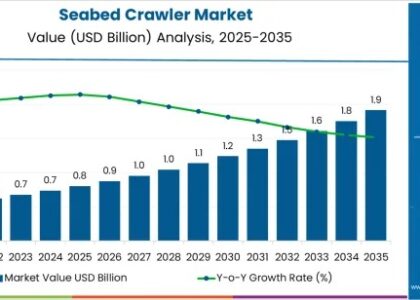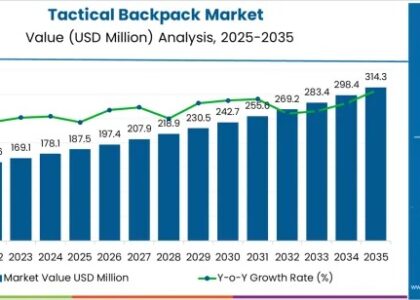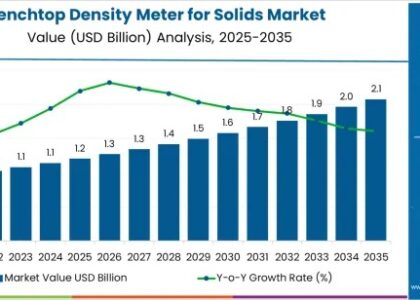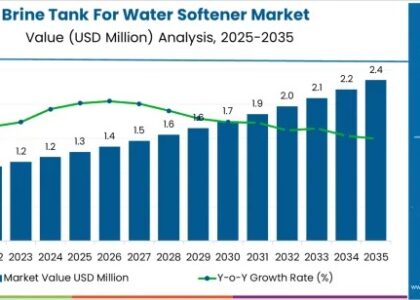
The automotive front end module market is projected to grow from USD 14,633.3 million in 2025 to USD 28,252.4 million by 2035, advancing at a robust compound annual growth rate (CAGR) of 6.8% during the forecast period. This strong market trajectory is being propelled by rising demand for modular vehicle architecture, rapid growth in electric vehicle (EV) production, and increasing emphasis on lightweight and compact design solutions across the automotive industry. As automotive OEMs strive to reduce vehicle weight and improve energy efficiency, front end modules that integrate multiple functions into a single assembly are becoming critical to streamlined manufacturing and performance optimization.
Automotive front end modules serve as pre-assembled components that house key systems such as radiators, air conditioning condensers, headlamps, bumpers, and impact-absorbing structures. These modules not only simplify the vehicle assembly process but also contribute significantly to weight reduction, crash safety, and thermal management. In electric and hybrid vehicles, FEMs are evolving to accommodate battery cooling systems, radar and sensor integration, and additional airflow optimization requirements. Automakers are increasingly partnering with suppliers to co-develop modular, scalable FEMs that align with both internal combustion and electric powertrain platforms. Additionally, regulatory pressures for pedestrian safety and environmental compliance are influencing design innovation within the FEM segment.
Get Ahead with Our Report: Request Your Sample Now!
https://www.futuremarketinsights.com/reports/sample/rep-gb-1547
Key Takeaways
The automotive front end module market is witnessing accelerated growth due to its central role in vehicle integration and modular production strategies. Lightweight material adoption, such as thermoplastics and composite blends, is becoming a defining trend, particularly as automakers aim to meet stringent emission and efficiency targets. Demand for front end modules is especially pronounced in regions where EV adoption is growing rapidly, including Europe, China, and North America. The ability of FEMs to consolidate critical vehicle systems into a single unit has made them indispensable for enhancing production speed, design flexibility, and aftermarket serviceability.
Emerging Trends in the Global Market
Material innovation is emerging as a cornerstone of the front end module market, with manufacturers shifting from traditional steel structures to engineered plastics, carbon fiber-reinforced composites, and hybrid material assemblies. These advanced materials not only reduce overall module weight but also provide enhanced durability and thermal performance. Another key trend is the increasing integration of advanced driver assistance systems (ADAS), requiring FEMs to accommodate sensors, cameras, and radar equipment within compact design footprints. The rise of digital manufacturing techniques, including 3D modeling and simulation-based engineering, is also streamlining FEM design processes, enabling faster customization and testing. Moreover, tier-1 suppliers are expanding their offerings to include intelligent modules with embedded electronics for diagnostics and predictive maintenance.
Significant Developments in the Global Sector: Trends and Opportunities in the Market
The market is undergoing a structural transformation as front end modules evolve from passive structural assemblies to active platforms that support critical vehicle functions. Opportunities are emerging from the integration of active grille shutters and airflow control technologies aimed at improving fuel efficiency and battery cooling in EVs. Suppliers are also developing modular FEM solutions that can be adapted to different vehicle models with minimal redesign, reducing tooling costs and accelerating time to market. As automakers transition to electric platforms, FEMs are being tailored to house vehicle charging components, front-mounted battery packs, and smart lighting systems. Additionally, sustainability initiatives are encouraging the use of recyclable materials and energy-efficient production practices in FEM manufacturing, aligning with corporate ESG goals.
Recent Developments in the Market
In recent years, the automotive FEM market has witnessed several collaborations between OEMs and module suppliers aimed at co-developing next-generation front end systems. Notable advancements include modular composite frames with interchangeable subcomponents and FEMs that incorporate pedestrian protection systems and ADAS sensors. Several leading manufacturers have expanded production capacities in Asia-Pacific and Europe to meet rising regional demand and ensure just-in-time delivery to assembly plants. The industry has also seen investments in digital twins and AI-based design tools that enable real-time validation and optimization of FEM components. Startups focusing on lightweight structural engineering are entering partnerships with established suppliers to introduce innovative thermal management and impact-absorbing technologies.
Detailed Market Study: Full Report and Analysis
https://www.futuremarketinsights.com/reports/automotive-front-end-module-market
Competition Outlook
The automotive front end module market is moderately consolidated, with leading global players maintaining competitive advantage through material expertise, strategic partnerships, and vertically integrated operations. Market players are emphasizing innovation, cost-effectiveness, and regional customization to cater to diverse customer needs. Competition is intensifying as companies race to develop scalable FEM platforms compatible with multiple vehicle architectures, including battery-electric vehicles (BEVs), plug-in hybrids (PHEVs), and autonomous vehicles. Investment in R&D, sustainable design, and manufacturing automation are key focus areas, along with aftermarket service offerings for FEM replacements and upgrades. Suppliers that offer end-to-end solutions—from concept design to manufacturing and validation—are emerging as preferred partners for OEMs.
Key Players
Leading players in the automotive front end module market include Magna International Inc., HBPO GmbH (a member of Plastic Omnium Group), Denso Corporation, Faurecia SE, Calsonic Kansei Corporation, Valeo SA, Hanon Systems, Mahle GmbH, Hyundai Mobis Co. Ltd., and Samvardhana Motherson Group. These companies have established strong R&D infrastructure and global production capabilities, enabling them to deliver customized, performance-optimized FEM solutions. Their portfolios encompass a wide range of FEM technologies including thermoplastic assemblies, integrated cooling systems, and sensor-compatible modules.
Key Segmentations
The automotive front end module market is segmented based on material type, vehicle type, component, sales channel, and region. By material, the market includes steel, aluminum, composites, and hybrid materials, with composites showing the highest growth due to their lightweight and design flexibility. By vehicle type, passenger vehicles dominate market demand, although commercial vehicles are increasingly adopting FEMs for assembly efficiency. Key components integrated into FEMs include bumpers, headlights, cooling systems, grille panels, and sensors. In terms of sales channel, OEMs lead due to the modular assembly benefits in vehicle production, while the aftermarket is also growing steadily, especially for repairs and upgrades. Geographically, Asia-Pacific is the largest market owing to the high volume of automotive production, followed by Europe and North America where innovation and EV deployment are accelerating.
About Future Market Insights (FMI)
Future Market Insights, Inc. (ESOMAR certified, recipient of the Stevie Award, and a member of the Greater New York Chamber of Commerce) offers profound insights into the driving factors that are boosting demand in the market. FMI stands as the leading global provider of market intelligence, advisory services, consulting, and events for the Packaging, Food and Beverage, Consumer Technology, Healthcare, Industrial, and Chemicals markets. With a vast team of 400 analysts worldwide, FMI provides global, regional, and local expertise on diverse domains and industry trends across more than 110 countries.
Contact Us:
Future Market Insights Inc.
Christiana Corporate, 200 Continental Drive,
Suite 401, Newark, Delaware – 19713, USA
T: +1-845-579-5705
For Sales Enquiries: sales@futuremarketinsights.com
Website: https://www.futuremarketinsights.com
LinkedIn| Twitter| Blogs | YouTube





